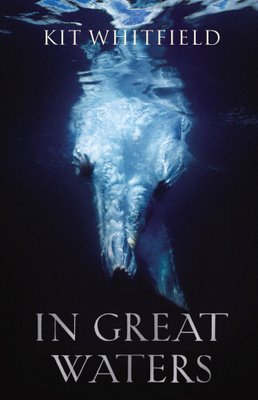
“I thought you meant to begin by umanning me,” admits Henry, the bastard half-breed protagonist of Kit Whitfield’s second novel, In Great Waters. He is speaking to Anne, a legitimate half-breed who is third in line to the throne of England. It’s a curious construction Henry uses: not only are neither he nor Anne entirely human; the genitals of which he is in fear are one of the more human things about him. Henry has just accused Anne’s murdered mother, Queen Erzebet, of wantoness: “He had not really meant that Erzebet fucked landsmen; if he thought about it, this girl must have been the child of a half-caste, her parents the children of half-castes, back and back, generations of hobbling spiders like her. She had understood what he meant, which was odd in itself; John or Allard would have frowned, made him explain.” [pg. 224]
Questions of otherness and similarity, race and ‘purity’, resonate throughout this accomplished novel. Henry and Anne are at such loggerheads on only their second meeting because their interests have been opposed, by the John and Allard Henry recalls above: the throne to which Anne has a claim has a weak royal family, populated beneath an elderly king by enfeebled men and youthful girls; Henry, washed up on the shore and discovered by Allard, represents a rival claim to that throne – a figurehead behind whom an army of renewal might rally.
Whitfield’s medieval England exists in an alternative past, in which the seas are inhabited by what appear to be adapted humans, deepsmen, who – following an invasion of Venice in the 9th century – have come, through interbreeding with the royal houses of the ‘landsmen’, to dominate European courts. (Only the landlocked ‘Switzers’ have fully human kings.) Simply put, alliances with deepsmen – possible only through half-breeds because of the vast linguistic and cultural differences between deepsmen and landsmen – are the sole means of establishing secure borders against rival states. A strong monarchy, as was of course the case in our own medieval world, is therefore crucial. Anne’s enervated family are ill-equippped to defend England; Henry, untainted by the consequences of in-breeding, represents a stronger future. The alternate history is too total to allow for exact parallels – is this the War of the Roses or the Northern Rebellion? – but the echo of all medieval unrest is here.
The novelty of the concept, then, is skilfully handled, deepened and textured throughout: this is no excuse for a generic fantasy with medieval trappings, but instead the placement of a recognisable medieval mindset upon a different world. Kari Sperring questions the novel on the basis of Whitfield’s assumption of “political stagnation”; the medieval world was neither stagnant nor uncreative, but it was fond of systems, precedent and order – Whitfield dramatises this nicely. If she doesn’t quite explain how Christianity – which, through the sympathetic character of Bishop Samuel Westlake, features heavily – remains in a recognisable form despite the total absence of the deepsmen from its sacred text and theology, she does much to show how a medieval world might have accomodated them. This refusal to reshape – but instead to adapt – is also shared by the novel’s characters, and, though at times a poorly wrought adaptation might let down a reader and appear as fudge, I think Niall Harrison is right to detect a Darwinian subtext to all this.
Indeed, the principle pleasure of the novel beyond its conceit is the way in which Whitfield shows Henry and Anne building their worldviews around their circumstances – adapting. A good chunk of the novel deals with Henry’s education by Allard, which proceeds fitfully because the deepsman’s mind is not adapted to concepts and dialogue in the way that the landsman’s is: “Understand, in Henry’s mind, was a word of imprisonment.” [pg. 41] Placing herself in a venerable literary tradition (Murdoch’s The Sea, The Sea comes particularly to mind, but so too might The Seafarer or Moby Dick), Whitfield’s sea is unknowable and untameable, and her deepsmen accept this by speaking a booming, musical language of simple commands and warnings, unadorned with the proprietary aspect of defintion. But Anne, too, though from birth more part of the landsman’s world than the deepsman’s, must be educated about the world – in her case towards a broader and more flexible view of people and all, good and ill, of which they are capable.
Henry and Anne thus ultimately meet halfway – a marriage of convenience to save a monarchy. At times, alas, Whitfield is as awkward as her central couple: her exposition, in particular, is often poorly handled, and too often a character’s epiphany is experienced as an internal question-and-answer session. So on the level of technique In Great Waters is less impressive than it is on the level of concept. It is still, however, a solidly written novel with three good characters (Henry, Anne and Westlake), a colourful, if occassionally one-note, supporting cast, and a robust, memorable world. As Martin Lewis implies at The SF Site, the book is a confident and entertaining entry in the human-as-alien/learning-the-world stable of SF&F novels; Owen Jones, too, has the book’s number when he says at SFF World that, “With any number of reasons why this novel could have failed, many inherent to the type and style of story chosen, this is a highly crafted piece worthy of a far more experienced writer.”
All of this suggests (though Martin in particular stretches further in his review) a book which is competent but not explosive: Whitfield has written a thoughtful and entertaining novel which may at times lack elan but never good intentions. It’s hard, then, not to like In Great Waters. It is also a book with a good deal to admire about it – although ultimately you may be more fond of than impressed by it.
2 thoughts on “Even A Pawn May Checkmate A King: ‘In Great Waters’”